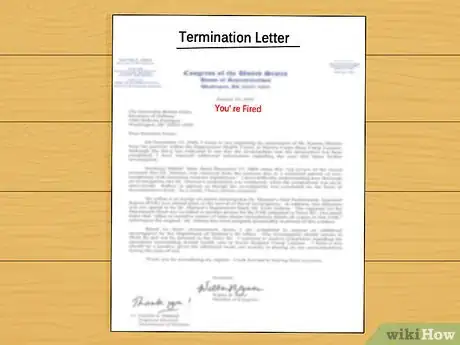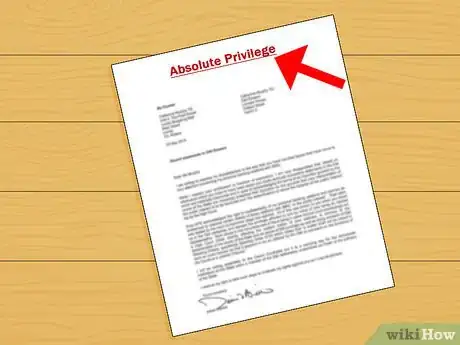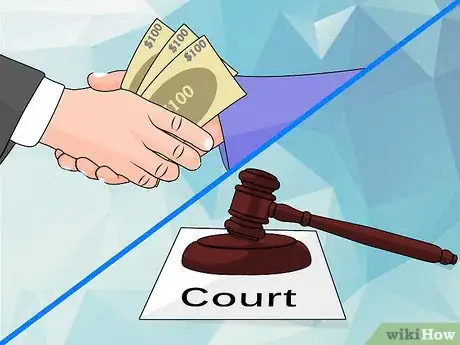This article was co-authored by Clinton M. Sandvick, JD, PhD. Clinton M. Sandvick worked as a civil litigator in California for over 7 years. He received his JD from the University of Wisconsin-Madison in 1998 and his PhD in American History from the University of Oregon in 2013.
There are 11 references cited in this article, which can be found at the bottom of the page.
wikiHow marks an article as reader-approved once it receives enough positive feedback. This article received 15 testimonials and 92% of readers who voted found it helpful, earning it our reader-approved status.
This article has been viewed 1,078,006 times.
If someone damages your reputation by way of slander or libel, you may have grounds to sue for defamation. "Slander" is the crime of making a false, spoken statement damaging a person’s reputation. "Libel" is a false published, written statement damaging a person’s reputation. Some states combine libel and slander claims under the umbrella term “defamation.” Other states still distinguish between the two, requiring the appropriate civil suit for the respective offense. Defamation cases are notoriously difficult to win since the burden of proof is on the plaintiff to prove that a statement is defamatory and damaging. Even if a statement is defamatory, many cases (such as cases involving someone who is a public figure) require proving actual malice.[1] Learn how to help your case if you are considering whether you have grounds to sue for defamation.
Steps
Making a Case
-
1Analyze the statement. Decide if the statement made against you falls into the category of slander, libel, or the blanket category of defamation. Some states—such as California—still make the distinction. Slander refers to spoken statements such as in speech or over the radio. Libel refers to written defamation such as in a book or newspaper.
- Since written statements tend to cause injury for a longer period of time, libel can be more harmful than slander. A published statement is also easier to prove after the fact, making it a stronger case when filing a suit.
-
2Prove that the statement was published. Published statements make a better case when seeking damages because you can more easily prove the mass exposure of the statement. Legally, "published" refers to information heard by a third party outside yourself and the defamer. Published doesn't necessarily mean printed in a book or newspaper, although that also counts. A published statement can also be made public in the following ways:
- On television or radio.
- In a speech.
- On a leaflet or picket sign.
- In loud conversation, which you could prove with the help of witnesses.
- Via gossip, which you could prove if you have an email chain or other witnesses.
- Via social media sites, including Twitter, Facebook, Youtube, and others.[2]
Advertisement -
3Prove the statement was false. A defamatory statement must actually be false. If true, you don't have grounds to sue. This includes if it damaged your reputation.
- Statements construed as opinions aren't considered defamatory in most cases. An opinion is subjective. You can't prove it objectively false.
- For example, the statement, “I think that Aaron is dumb because he likes ice cream” would be an example of an opinion since the person making the statement provides a basis for the opinion (i.e., Aaron likes ice cream). On the other hand, the blanket statement, “I know for a fact that Aaron was convicted of murdering his mother in Texas” would unlikely be considered an opinion since the person reading or hearing the statement would have to assume damaging facts.[3]
-
4Prove that the statement caused injury. You must show that the statement harmed you in a concrete way. Assess how the statement affected you. Determine whether you can prove that your life changed for the worse because people believed the statement and now view you differently. If nobody believed the statement, then there was no real harm.
- If you've lost work, are shunned by friends and family, or were harassed as a direct result of the statement, you can consider it to be injurious. If you already had a bad reputation (or if most people didn’t seem to believe the statement), it will be hard to prove that you were defamed by this particular statement.[4]
-
5Prove “special damages.” For slander in particular, you have to prove “special damages.” “Special damages” refer to damages that are capable of being calculated, typically to the dollar.[5] Examples include lost earnings or lost future earnings.
- Some states, including California, use a “defamation per se” standard, which means that the statements are defamatory on their face. The four most common examples include: the implication that you have a contagious disease, such as HIV; that you committed a criminal offense; that you are unchaste or committed adultery; or that your professional reputation is called into question.
-
6Determine if the statement is protected by “absolute privilege.” In some legal situations, people are asked to make statements without having to worry that they will get sued for defamation. Such statements are protected by “absolute privilege.” For example, a witness could testify falsely in court and the statement may have the same consequences as any other defamatory statement, but that witness is protected by absolute privilege.[6]
- Other statements protected by “absolute privilege” include statements made during judicial proceedings; statements made by governmental officials; statements by legislators during legislative debates; statements made during political speeches or broadcasts; and statements between spouses.[7]
-
7Determine if the statement is protected by “qualified privilege.” In some circumstances, people have a right to make a particular statement. Such statements are considered “qualified privileged.” For example, statements by an employer about whether a former employee is fit to perform a new job may be protected by the qualified privilege.
- Other statements protected by “qualified privilege” include statements in governmental reports or official proceedings; statements made by local governmental officials; testimony by citizens at legislative proceedings; statements made in self-defense or made in an attempt to warn others of danger; some types of statements made by former employers to a potential employer about an employee; and statements published in a book or film review considered criticism.[8]
- Depending on your state, if a statement is protected by “qualified privilege,” the person suing must prove the person making the alleged defamatory statement did so intentionally, recklessly, or with malice, hatred, spite, ill will, or resentment.
Serving a Defamation Complaint
-
1Inform the publisher and request a retraction. To either file a defamation lawsuit or recover all of your damages, some states require you to inform the publisher that the statement is false and ask for a retraction. If the publishers conduct an investigation and determine that the statement was false and issue a retraction, they can mitigate some of their damages.
-
2Meet with an attorney to discuss your case. After conducting your own research and determining you have a case, consult with an attorney experienced with this type of lawsuit. Defamation laws contain gray areas and vary from state to state. Your best chance at success will be to hire an attorney. Your state or county bar association may have free referral services to qualified local attorneys and may also offer free consultations with attorneys who specialize in handling the legal issues relevant to your case. Bring the following information to your meeting:
- An account of exactly what happened with regard to the defamatory statement and the circumstances surrounding it.
- Documents, printed publications, email printouts, recordings, and other records of the defamatory statement.
- Written statements of witnesses (third parties) who either heard or read the defamatory statements made by the defendant.
- Some type of proof that the statement is not true.
- Any proof you have that the defamatory statement fulfills the requirements for suing for defamation, such as proof that you lost work, proof that your family no longer talks to you, etc.
-
3Consider Alternative Dispute Resolution. With Alternative Dispute Resolution (ADR), parties often share the cost of hiring a neutral mediator, who is not necessarily a lawyer, to assist with working out a mutually agreeable outcome. The ADR process includes a neutral third-party evaluation, negotiation, and mediation.[9] ADR is often less adversarial, more efficient, and less expensive than engaging in formal legal processes by filing a lien.
- Your local county court may have more information about ADR. You can also find a list of ADR resources at: http://guides.library.harvard.edu/content.php?pid=442479&sid=3626842
-
4Consider Arbitration. Arbitration is another form of ADR that allows parties to litigate the dispute without going to court. Arbitration may be binding or non-binding.[10]
- If the parties agree to binding arbitration, they waive their right to a trial and agree to accept the arbitrator’s decision as final.
- Non-binding arbitration means the parties may request a trial if they do not accept the arbitrator’s decision.
-
5Fill out a defamation complaint and file your lawsuit. Obtain a civil complaint form from your county civil court. You can often find forms on court websites. You will need to provide the name and address of the person who defamed you, as well as a summary of your case. You also need to provide information as to what damages you seek.
- If you hired an attorney, your attorney will draft the complaint and file it with the court. If you did not hire an attorney, ask another person to review your complaint. Be sure it's filled out properly and that you include information that will help your case.
- Get two copies of the complaint: one to keep and one to serve the defendant.
-
6Have the defendant served with a copy of the complaint. The process for doing this varies according to the jurisdiction. Note, corporations and limited liability companies (LLCs) often designate specific, assigned agents for service. You can locate a corporation or LLC’s registered agent by visiting your Secretary of State’s website. You may also check the company’s website or call the company and ask who can accept service on behalf of the company. Check with the court clerk, a local attorney, or your state’s Civil Rules of Procedure for state specific rules and regulations. Common methods of service include the following:
- Personal service - Personal service means the hand delivery of the document by someone other than yourself. All states require that the person delivering the document(s) is at least 18 years old. Many also require that the party delivering the document(s) sign and file with the court an affidavit of service, describing how he or she delivered the document.
- First Class U.S. mail - Most mail you send and receive is likely sent this way. Although serving many types of court documents via first class mail is acceptable, it may not be in the case in your state. Be sure to check with the court clerk to find out if this is an acceptable method of service.
- Certified mail - Certified mail, whether a return receipt is requested or not, is almost always an acceptable form of service. However, you should double check with the court clerk to ensure that your state allows service in this manner.
Deciding Whether to Go to Court
-
1Negotiate a settlement, if possible. Once the defendant and his or her attorney see the proof of defamation, they may be willing to discuss a settlement and avoid going to court. If your aim is to receive damages, this may be the best option for you. If you want to restore your good name, you might decide to go to court instead so you have the chance to bring the truth to light.
-
2Go to court if necessary. Be prepared to present evidence proving that the statement made against you is untrue and injurious. Remember that if the defendant can prove that the statement is actually true, the case will be dismissed.
- Discuss your options regarding trial by jury or a bench trial. A bench trial is a trial where only the judge hears the evidence and rules on whether you have suffered harm to reputation.
- You can find more information regarding what to expect if the case goes to trial at How to File a Lawsuit.
Warnings
- This article is for informational purposes only and not for the purpose of providing legal advice. You should contact an attorney to obtain advice with respect to your particular issue or problem. If you need additional guidance, you may contact a lawyer through your state bar association at: https://www.americanbar.org/groups/legal_services/flh-home/⧼thumbs_response⧽
- Filing a defamation lawsuit can give rise to an anti-“SLAPP” action against you. “SLAPP” is an acronym for Strategic Lawsuits Against Public Participation. SLAPP lawsuits are designed to freeze freedom of speech by intimidating and silencing critics. Anti-SLAPP laws are designed to protect people from meritless and abusive litigation. [11]
- States with anti-SLAPP legislation give the person being sued for defamation (the defendant) an opportunity to strike the case because the alleged defamatory statement may pertain to speech regarding a matter of public concern.[12] Anti-SLAPP actions address whether the defamation complaint is malicious.
- If the defendant makes a motion to strike, the plaintiff with the defamation claim has the burden of showing the probability that he/she will prevail in the suit. If the defendant prevails on any part of the motion to strike, some state laws require the plaintiff to pay the defendant’s attorney fees.[13]
- Anti-SLAPP actions can turn the tables on plaintiffs who file meritless defamation actions. Check with an experienced attorney before filing a defamation lawsuit.
⧼thumbs_response⧽
References
- ↑ New York Times v. Sullivan, 376 U.S. 254 (1964)
- ↑ http://injury.findlaw.com/torts-and-personal-injuries/defamation-law-the-basics.html
- ↑ http://www.dmlp.org/legal-guide/opinion-and-fair-comment-privileges
- ↑ http://www.nolo.com/legal-encyclopedia/defamation-law-made-simple-29718.html
- ↑ http://www.nolo.com/legal-encyclopedia/damages-defamation-case.html
- ↑ http://www.nolo.com/legal-encyclopedia/defamation-law-made-simple-29718.html
- ↑ http://www.nolo.com/legal-encyclopedia/privileges-defenses-defamation-cases.html
- ↑ http://www.nolo.com/legal-encyclopedia/privileges-defenses-defamation-cases.html
- ↑ http://www.law.cornell.edu/wex/alternative_dispute_resolution
- ↑ http://www.sdcourt.ca.gov/portal/page?_pageid=55,1555406&_dad=portal
- ↑ http://www.dmlp.org/legal-guide/responding-strategic-lawsuits-against-public-participation-slapps
- ↑ http://www.anti-slapp.org/your-states-free-speech-protection/
- ↑ http://www.casp.net/sued-for-freedom-of-speech-california/what-is-a-first-amendment-slapp/
About This Article
Before suing for defamation, first make sure you can prove that someone published a false, negative statement about you, then ask them for a retraction of their statement. Next, consult with an attorney who can help you resolve the dispute in arbitration or file a civil complaint. After a complaint is filed, decide whether you want to negotiate a settlement or go to court for a trial. For what to expect if you go to court, read on for information from our Legal reviewer.







































































